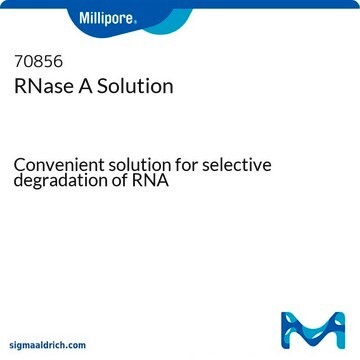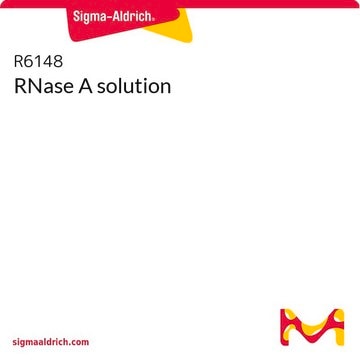RNASEA-RO
Roche
RNase A
from bovine pancreas
Synonim(y):
Rnase
Zaloguj sięWyświetlanie cen organizacyjnych i kontraktowych
About This Item
Polecane produkty
pochodzenie biologiczne
bovine pancreas
Poziom jakości
Postać
dry powder
aktywność właściwa
50 U/mg (+25°C, RNA as substrate)
masa cząsteczkowa
Mr = 13,700
opakowanie
pkg of 100 mg (10109169001)
pkg of 25 mg (10109142001)
producent / nazwa handlowa
Roche
Parametry
65 °C optimum reaction temp.
metody
flow cytometry: suitable
optymalne pH
7.0-7.5
temp. przechowywania
2-8°C
Powiązane kategorie
Opis ogólny
Bovine pancreatic RNase A is a member of the RNase A protein superfamily. It is one of the most characterized proteins, and is a kidney shaped basic protein. This protein is composed of 124 amino acids. In its native form, RNase A exists as a homodimer.
Zastosowanie
- For analytical purposes
- Isolation of DNA (for this purpose, RNase A should be boiled)
- For cell cycle analysis by flow cytometry and propidium iodide (PI) staining
Działania biochem./fizjol.
RNase A catalyzes the transphosphorylation and degradation of RNA. It was the first protein identified to exhibit DNA melting functionality. This enzyme binds to several binding sites on single stranded (ss) RNA polynucleotide chain before degrading it. It interacts with ssDNA in a similar manner, which is responsible for its ‘DNA unwinding′ property. RNase A dimer obtained through tandemization shows toxicity to cancer cells.
Definicja jednostki
One unit is the enzyme activity that causes a decrease in absorbance of A0 to A1 within 1 minute under assay conditions. A0 to A1 corresponds to the total conversion, A1 being the final absorbance.
Rekonstytucja
RNase A can be dissolved at a concentration of 1 to 10 mg/ml in 10 mM Tris-HCl, pH 7.5, 15 mM NaCl, heated to 100 °C for 15 minutes to inactivate contaminating DNases and cooled slowly to room temperature and dispend into aliquots. Roche recommends subsequent storage at -15 to -25 °C.
Inne uwagi
For life science research only. Not for use in diagnostic procedures.
Kod klasy składowania
11 - Combustible Solids
Klasa zagrożenia wodnego (WGK)
WGK 1
Temperatura zapłonu (°F)
Not applicable
Temperatura zapłonu (°C)
Not applicable
Certyfikaty analizy (CoA)
Poszukaj Certyfikaty analizy (CoA), wpisując numer partii/serii produktów. Numery serii i partii można znaleźć na etykiecie produktu po słowach „seria” lub „partia”.
Masz już ten produkt?
Dokumenty związane z niedawno zakupionymi produktami zostały zamieszczone w Bibliotece dokumentów.
Klienci oglądali również te produkty
Amit Kumar Dinda et al.
Journal of photochemistry and photobiology. B, Biology, 162, 535-543 (2016-08-01)
Several DNA binding proteins exist in dimeric form when bound with DNA to be able to exhibit various biological processes such as DNA repair, DNA replication and gene expression. Various dimeric forms of Ribonuclease A (RNase A) and other members
Christopher J Ott et al.
Blood, 120(14), 2843-2852 (2012-08-21)
We investigated the therapeutic potential of JQ1, an inhibitor of the BET class of human bromodomain proteins, in B-cell acute lymphoblastic leukemia (B-ALL). We show that JQ1 potently reduces the viability of B-ALL cell lines with high-risk cytogenetics. Among the
Simon Asbjørn Larsen et al.
Chemistry Central journal, 6(1), 18-18 (2012-03-20)
Various by-products of the cellular metabolism, such as reactive carbonyl species (RCS) are potentially harmful to cells and tissues, and play a role in many physiological and pathological processes. Among various RCS is the highly reactive dicarbonyl glyoxal (GO), which
Marieke Louwers et al.
Nature protocols, 4(8), 1216-1229 (2009-08-01)
Gene regulation in higher eukaryotes frequently involves physical interactions between genomic sequence elements tens of kilobases apart on the same chromosome but can also entail interactions between different chromosomes. Chromosome Conformation Capture (3C) is a powerful tool to identify such
Bruno D Fonseca et al.
The Journal of biological chemistry, 290(26), 15996-16020 (2015-05-06)
The mammalian target of rapamycin complex 1 (mTORC1) is a critical regulator of protein synthesis. The best studied targets of mTORC1 in translation are the eukaryotic initiation factor-binding protein 1 (4E-BP1) and ribosomal protein S6 kinase 1 (S6K1). In this
Nasz zespół naukowców ma doświadczenie we wszystkich obszarach badań, w tym w naukach przyrodniczych, materiałoznawstwie, syntezie chemicznej, chromatografii, analityce i wielu innych dziedzinach.
Skontaktuj się z zespołem ds. pomocy technicznej






